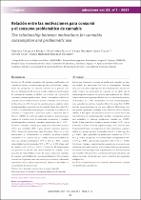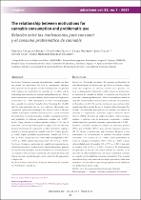| dc.contributor | Departament de Salut |
| dc.contributor.author | Casajuana Kögel, Cristina |
| dc.contributor.author | López-Pelayo, Hugo |
| dc.contributor.author | Oliveras, Clara |
| dc.contributor.author | Colom-Farran, Joan |
| dc.contributor.author | Gual, Antoni |
| dc.contributor.author | Balcells Olivero, Maria Mercè |
| dc.date.accessioned | 2022-02-04T10:35:41Z |
| dc.date.available | 2022-02-04T10:35:41Z |
| dc.date.issued | 2021-01-15 |
| dc.identifier.citation | Casajuana Kögel C, López-Pelayo H, Oliveras C, Gual A, Balcells-Oliveró MM Colom J. Relación entre las motivaciones para consumir y el consumo problemático de cannabis. Adicciones. 2021 Jan 15;33(1):31-42. |
| dc.identifier.issn | 0214-4840 |
| dc.identifier.uri | https://hdl.handle.net/11351/6974 |
| dc.description | Atenció centrada a la persona; Cannabis; Motivació per al consum; Consum problemàtic de cànnabis |
| dc.language.iso | spa |
| dc.language.iso | eng |
| dc.publisher | Socidrogalcohol |
| dc.relation.ispartofseries | Adicciones;33(1) |
| dc.rights | Attribution-NonCommercial-NoDerivatives 4.0 International |
| dc.rights.uri | http://creativecommons.org/licenses/by-nc-nd/4.0/ |
| dc.source | Scientia |
| dc.subject | Cànnabis |
| dc.subject | Drogoaddicció - Aspectes psicològics |
| dc.subject | Atenció centrada en el pacient |
| dc.subject.mesh | Cannabis |
| dc.subject.mesh | Substance-Related Disorders |
| dc.subject.mesh | /psychology |
| dc.subject.mesh | Patient-Centered Care |
| dc.title | Relación entre las motivaciones para consumir y el consumo problemático de cannabis |
| dc.title.alternative | The relationship between motivations for cannabis consumption and problematic use |
| dc.type | info:eu-repo/semantics/article |
| dc.identifier.doi | 10.20882/adicciones.1221 |
| dc.subject.decs | Cannabis |
| dc.subject.decs | trastornos relacionados con sustancias |
| dc.subject.decs | /psicología |
| dc.subject.decs | atención centrada en el paciente |
| dc.relation.publishversion | https://doi.org/10.20882/adicciones.1221 |
| dc.type.version | info:eu-repo/semantics/publishedVersion |
| dc.audience | Professionals |
| dc.contributor.authoraffiliation | [Casajuana Kögel C, López-Pelayo H, Oliveras C, Gual A, Balcells-Oliveró MM] Grup de Recerca en Addiccions Clínic (GRAC-GRE), Institut d’Investigacions Biomèdiques August Pi i Sunyer (IDIBAPS), Hospital Clínic i Universitari de Barcelona, Universitat de Barcelona, Barcelona, Spain. [Colom J] Sub-direcció general de drogodependències, Agència de Salut Pública de Catalunya, Departament de Salut, Generalitat de Catalunya, Barcelona, Spain |
| dc.identifier.pmid | 31018002 |
| dc.rights.accessrights | info:eu-repo/semantics/openAccess |


